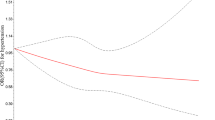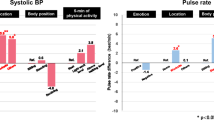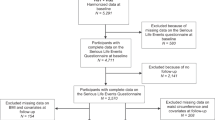Abstract
Objective: The importance of stress in the pathogenesis of essential hypertension is controversial. In this study we wanted to evaluate the relation between self-perceived stress and the blood pressure (BP) in a asymptomatic healthy population.Subjects and methods: A total of 1666 guests (mean ± s.d. age 50 ± 16 years) attending the air show AIR94 in Buochs, Switzerland volunteered to participate in a cross-sectional study. Using a self-administered questionnaire and visual analogue scales the individual stress perception and other cardiovascular risk behaviours/factors were assessed. BP, body weight, height, and the waist:hip ratio were measured.Results: Individual stress perception was inversely related with the systolic BP (SBP) (r = −0.12, P < 0.001). the relationship was found in both men and women and was independent of age and/or body weight. no relation was found between the diastolic bp (dbp) and stress perception. subjects with high normal bp according the jnc v classification showed a lower stress perception than did subjects with normal bp. in a multiple regression model the stress score was fourth most predictive of the sbp after body mass index, waist:hip ratio, and age followed by alcohol and fat intake.Conclusion: In this study we found an inverse association between the self-perceived stress and SBP. We suggest that the inverse association between BP and the self-perceived stress reflects a neuroendocrine and biochemical setting characterized by inadequate stress handling associated with a higher fat and alcohol intake and more abdominal fat tissue leading to a higher BP. Our data suggest that stress denial in combination with abdominal obesity, alcohol consumption, and smoking may be proxy for a high stress level.
This is a preview of subscription content, access via your institution
Access options
Subscribe to this journal
Receive 12 digital issues and online access to articles
$119.00 per year
only $9.92 per issue
Buy this article
- Purchase on Springer Link
- Instant access to full article PDF
Prices may be subject to local taxes which are calculated during checkout
Similar content being viewed by others
Author information
Authors and Affiliations
Rights and permissions
About this article
Cite this article
Suter, P., Maire, R., Holtz, D. et al. Relationship between self-perceived stress and blood pressure. J Hum Hypertens 11, 171–176 (1997). https://doi.org/10.1038/sj.jhh.1000409
Received:
Revised:
Accepted:
Issue Date:
DOI: https://doi.org/10.1038/sj.jhh.1000409
Keywords
This article is cited by
-
Association between perceived stress and hypertension in Chinese adults: a population-based survey
Journal of Human Hypertension (2022)
-
Blood pressure and associated factors in a North African adolescent population. a national cross-sectional study in Tunisia
BMC Public Health (2012)
-
Relationship of Strength of Social Support and Frequency of Social Contact with Hypertension and General Health Status Among Older Adults in the Mobile Care Unit in Kuwait
Journal of Cross-Cultural Gerontology (2011)
-
Expression of gLTP in Sympathetic Ganglia of Obese Zucker Rats In Vivo: Molecular Evidence
Journal of Molecular Neuroscience (2008)
-
Perceived stress among a workforce 6 months following hurricane Katrina
Social Psychiatry and Psychiatric Epidemiology (2007)



